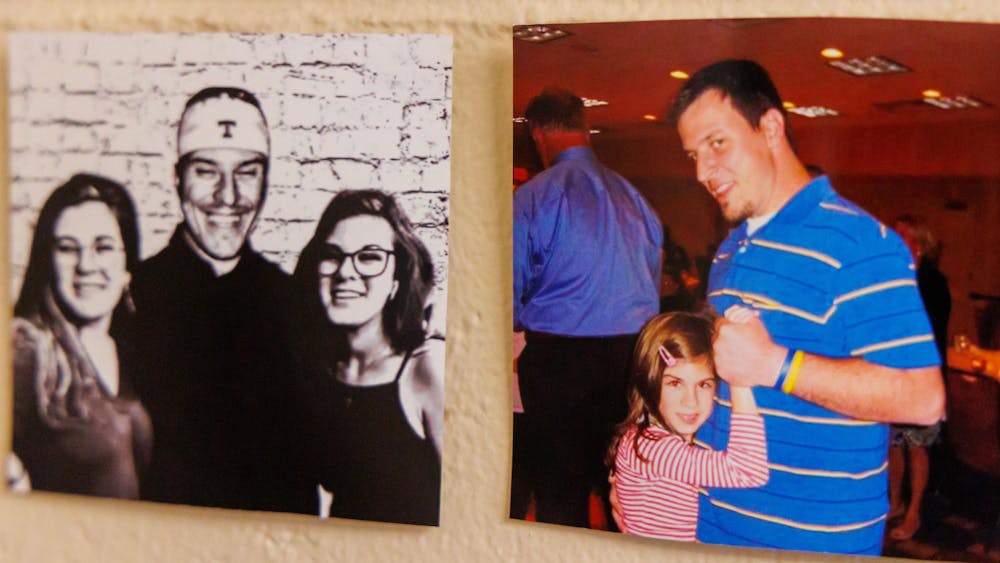Amidst the large Tudor-style homes that line the streets south of campus sits a beautiful brick house with ivy growing up the sides. Within that house, shelves of books and M.C. Escher prints line the walls, giving only the feeling of wisdom. There, College of Arts and Sciences distinguished professor Doug Hofstadter nestles in piles of research, pondering his latest cognitive theory.\nHofstadter has won the Pulitzer Prize and the American Book Award, and coincidentally authored the first item ever sold on Amazon.com. \nBut he doesn’t like to be associated with his awards and accomplishments. He said he works for the sake of discovery, not for the opportunity to earn recognition. \n“I can’t say that I don’t like the fact that I won a Pulitzer,” he said. “It was a very major piece of good luck, and I got a great deal of freedom from the University. So I can’t say that prizes are ‘good’ or ‘evil.’”\nHofstadter has an unconventional role in the University. As a distinguished college professor, he’s not restricted to one department. The former Guggenheim Fellow has the freedom to choose and change departments as his research interests evolve, said J. Michael Dunn, retired dean of the School of Informatics, who used to work with Hofstadter.\n“He has given the word ‘interdisciplinary’ a completely new meaning,” Dunn said. “His work straddles art, literature, music, computer science, \ncognitive science, logic, mathematics, physics and philosophy, to name just the most obvious.”\nThough he earned his Ph.D. in physics from the University of Oregon, Hofstadter’s research interests lie entirely within cognitive thinking. \nColleague Steve Johnson, a professor in the computer science department, said Hofstadter is currently working on a theory of thought mechanics, or how the brain actually works and processes information. \n“He has this idea that the brain is used only by analogical thinking,” Johnson said. He said this means people learn by comparing what they already know to something new. “I really think that he’s on to something with that theory.”\nHofstadter’s interest in science is not new to his family. His father won a Nobel Prize for physics in 1961 for his work on electron scattering in atomic nuclei and discoveries of the structure of nucleons. After his father won, Hofstadter said that he recalled all the pageantry, banquets and balls that took place in Stockholm, Sweden. But he never felt overshadowed by his father’s success. \n“I instead had this feeling, like I was in a bright light, and glory,” he said. “It suggested to me that I came from a family of very smart people, and therefore I was going to be smart and successful. My father’s success gave me a sort of unconscious inner sense of worth.”\nThat “sense of worth” gave the young Hofstadter a boost, indeed, when in 1980, he won a Pulitzer Prize for his book, “Godel, Escher, Bach: an Eternal Golden Braid,” which explores human thought and creativity and the prospect of artificial intelligence being able to imitate those processes, according to Amazon.com. \nIn 1995, his book “Fluid Concepts and Creative Analogies” became the first sold on Amazon.com. Hofstadter refused any credit for the book’s accidental claim to fame, retaining his position that “it’s like cheating to think of it as any distinction.”\n“It was all by a piece of chance,” he said. \nFive years after the book’s placement on Amazon, Hofstadter read an e-mail from a friend that said Jeff Bezos, Amazon.com’s founder, had “just appeared on some talk show ... and he’s holding up your book as the first thing sold.”\nHofstadter explained that he has distaste for huge awards, but assures that he is not speaking out of jealousy.\n“My dad wasn’t a superhuman,” he said. “He was just someone interested in certain things that got the certain job at a certain place with certain equipment. He had good ideas, he systematically did some experiments and he found some nice things. I abhor the idea of people going out seeking prizes. It is ridiculous and sad and pathetic. It’s a pitiful kind of motivation.”\nScholarly success might be common within his family, but Hofstadter refuted the idea of pressuring his children, Danny, 19, and Monica, 16, into academic accomplishment. \n“I have no expectations of my children, but I do hope that they will do well in the direction that they decide to go and that they will flourish,” he said. “I feel very close to my two children, and have always tried to be a person who will listen to them and talk to them about things that matter.”\nAfter the tragic death of his wife Carol in 1993, Hofstadter was left to raise his two children by himself. His son Danny, however, praised his father. \n“He has been an awesome dad for being a single parent for all this time,” he said. \nCarol Hofstadter, a graduate of IU, passed away from a brain tumor at the age of 42. In her memory, Doug Hofstadter and one of Carol’s favorite professors, Edoardo Lèbano, are starting the Carol Ann Brush Hofstadter Memorial Scholarship, an award given to several IU students annually who are participating in the Bologna, Italy, overseas study program, just as Carol had done. \nIn the meantime, Hofstadter spends his time working on three new books, in addition to running daily, studying languages (he fluently speaks French and Italian, but also knows Russian, Mandarin, Spanish, Russian, German and Swedish) and taking yearly trips to California and Italy with his children. \nHe has no plans of leaving IU because he said he feels the most grounded and established here. \n “I’d like to think that (the University) likes the research work that I do, the graduate students that come from my research center and the books that I’ve published,” he said. “I’m not one of these academics who writes only about abstract things: I’m at a very concrete, down-to-earth level.”
Eyes not on the prize

Get stories like this in your inbox
Subscribe





